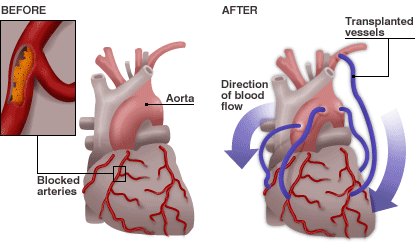 Researchers have said that for patients with difficult-to-treat clogged arteries, a bypass surgery was better than drug stents. Based on the results of a major clinical study by Dutch researchers presented at the European Society of Cardiology meeting in Munich, experts said patients who had angioplasties were twice as likely to require another procedure within a year. Douglas Weaver, president of the American College of Cardiology, said, "Despite the advent of drug-eluting stents surgery comes out a winner."
Researchers have said that for patients with difficult-to-treat clogged arteries, a bypass surgery was better than drug stents. Based on the results of a major clinical study by Dutch researchers presented at the European Society of Cardiology meeting in Munich, experts said patients who had angioplasties were twice as likely to require another procedure within a year. Douglas Weaver, president of the American College of Cardiology, said, "Despite the advent of drug-eluting stents surgery comes out a winner."
Doctors have two options when arteries become blocked as a means of treatment. The first is the increasingly popular, angioplasty, a non-surgical procedure where a balloon is pushed into a blood vessel to flatten the blockage, leaving a stent to prop the artery open, while in a bypass surgery, blood vessels are rerouted to detour around blockages. Introduced in the 1990’s, stenting gained popularity as doctors treated patients by inserting a catheter in the groin, a procedure that resulted in quick recovery time and patients are often walking around three days after the procedure. A bypass surgery is more complex and requires open heart surgery, a five hour long procedure under general anesthesia and patients need at least a month to recover fully.
In the study, paid for by Boston Scientific, makers of the drug-coated stent used in the trial, European doctors compared the effectiveness of open-heart surgery versus angioplasty on more than 3,000 patients in Europe and the United States. Patients who had acute heart attacks were excluded while those who had single and multiple vessel blockages were included in the study.
One third of the patients had medical conditions that required surgery while the remaining patients were randomly assigned to receive either surgery or an angioplasty. An average of nearly five stents was needed by patients who got an angioplasty.
One year later 14 % of the angioplasty patients needed a repeat procedure as compared to the 6 % of the surgery patients. Surgery patients had a lower death rate at 3.5 % while it was 4.3 % in the angioplasty patients. On the stroke risk front the surgery patients had a 2 % risk compared to the nearly zero risk for the angioplasty patients as doctors said surgery had an inherent stroke risk as compared to angioplasty.
Dr. Heinz Drexel, professor of medicine at the University of Innsbruck in Austria and spokesman for the European Society of Cardiology said, "If you don't want to have another heart operation for at least a decade, you should pick the surgery. But that means you have to have your chest cracked open.” Drexel was not connected to the research.
A study published in the New England Journal of Medicine found bypass surgery to be preferable for patients who had more than one clogged artery. "Surgery still comes out as the winner in a head-to-head trial," said Dr Weaver. "This comes down to a conversation with patients and making sure they know that with an angioplasty, there will be a higher rate of revascularization," he said, referring to the need for repeat procedures.
Dr. Tim Gardner, president of the American Heart Association said, "You invest more in terms of recuperation with surgery. But the advantage is durability."
Jonathan Halperin of New York's Mount Sinai Medical Center said, "The results of this study are perhaps going to cause cardiologists to pause for a moment and think before they necessarily assume that these are balanced technologies, where one is the equivalent of the other."
Keith Dawkins, Associate Chief Medical Officer at Boston Scientific, said despite not achieving its main goal, the study was reassuring for stent use. He told Reuters, "The primary endpoint was missed. But it wasn't missed because of safety concerns; it was missed due to revascularization.” Revascularization is the repeated need to clear blocked arteries.
Medical experts feel more data and research is needed and patients to be tracked for a longer period of time before it can be decided which is better surgery or angioplasty. "This only tells us what happens after one year," Drexel said. "We need to wait for at least five years to get a good answer about which therapy is really better."
No comments:
Post a Comment